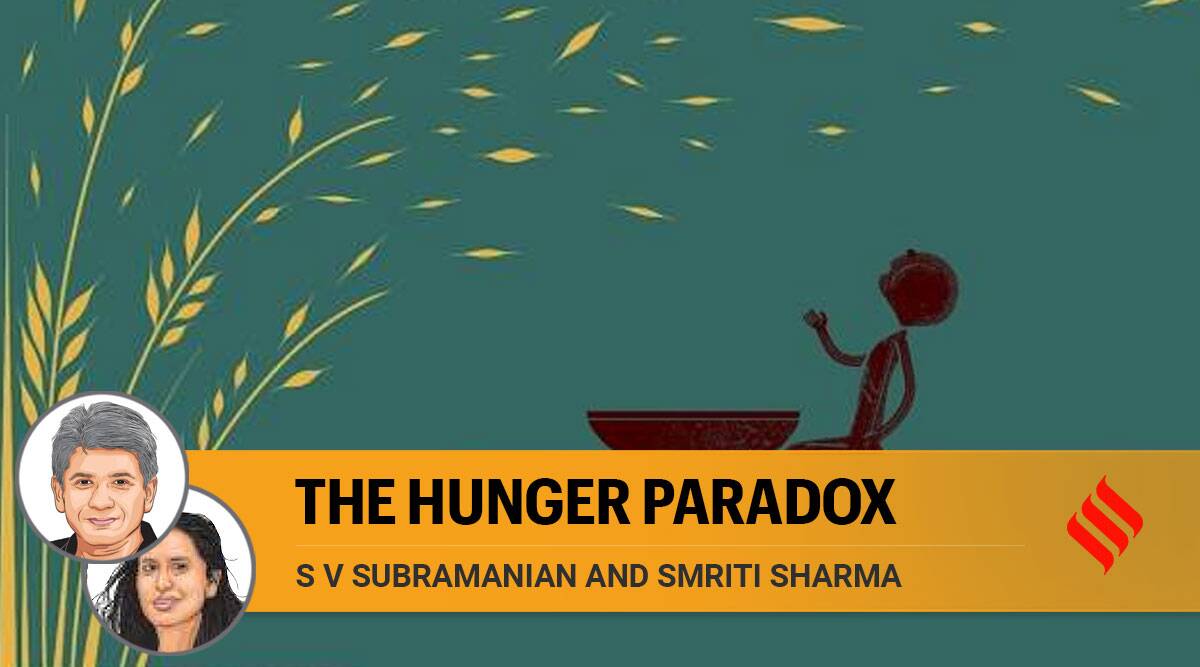Ahmedabad
(Head Office)Address : 506, 3rd EYE THREE (III), Opp. Induben Khakhrawala, Girish Cold Drink Cross Road, CG Road, Navrangpura, Ahmedabad, 380009.
Mobile : 8469231587 / 9586028957
Telephone : 079-40098991
E-mail: dics.upsc@gmail.com

The Hunger Paradox in India
News: To achieve the goal of zero hunger, India must immediately focus on India’s youngest children.
Background:
As per fifth National Family Health Survey (NFHS-5) data, 18% of children between ages 6-23 months, did not eat any food whatsoever in the 24 hours preceding the survey.
Important facts:
According to the WHO, a minimum of 33% of the daily calorie intake is expected to come from food (at six months of age). The child obtains the remaining calories through “on-demand” breastfeeding.
According to NFHS-5 Data, the zero-food prevalence was 30 % for infants aged 6-11 months, remains worryingly high at 13% among the 12-17 months old, and persists even among 18-23 months-old children at 8%
More than 80% had not consumed any protein-rich foods for an entire day.
Close to 40% did not eat any grains for an entire day, and six out of 10 children do not consume milk or dairy of any form every day.
This data reflects worrying scenario concerning Food insecurity in India.
What are the challenges with NFHS surveys?
The assessment of the extent of nutritional deprivation among young children in India has relied on measures such as stunting, wasting, compared to a reference population. These measures suggest overall deficiencies in the child’s environment, without any guidance on the specific nature of the deficiencies.
Given their multifactorial nature with regard to what causes stunting or wasting among children, the specific nature of the deficiencies must be assessed. For this, assessments using household-level food insecurity modules developed by the FAO can be adapted.
Zero-food underscores that achieving sufficiency in food production (the world’s leading country in milk production) does not necessarily mean attaining food security.
Way Forward:
Multiple (not single) ministries/departments of the Government of India should take responsibility for designing, implementing and monitoring policies.
A national effort to establish routine dietary and nutritional assessments for the entire population is the need of the hour.
Measuring the availability, accessibility and affordability of nutritious food constitutes the foundation for any evidence-based policy to end hunger and improve nutritional security among Indians.
To achieve the SDG 2 of zero hunger, India should consider a strategic initiative aimed at eliminating food insecurity by ensuring adequate-affordable-accessible-nutritionally diverse food, with a special and immediate focus on mothers and children.

Address : 506, 3rd EYE THREE (III), Opp. Induben Khakhrawala, Girish Cold Drink Cross Road, CG Road, Navrangpura, Ahmedabad, 380009.
Mobile : 8469231587 / 9586028957
Telephone : 079-40098991
E-mail: dics.upsc@gmail.com
Address: A-306, The Landmark, Urjanagar-1, Opp. Spicy Street, Kudasan – Por Road, Kudasan, Gandhinagar – 382421
Mobile : 9723832444 / 9723932444
E-mail: dics.gnagar@gmail.com
Address: 2nd Floor, 9 Shivali Society, L&T Circle, opp. Ratri Bazar, Karelibaugh, Vadodara, 390018
Mobile : 9725692037 / 9725692054
E-mail: dics.vadodara@gmail.com
Address: 403, Raj Victoria, Opp. Pal Walkway, Near Galaxy Circle, Pal, Surat-394510
Mobile : 8401031583 / 8401031587
E-mail: dics.surat@gmail.com
Address: 303,305 K 158 Complex Above Magson, Sindhubhavan Road Ahmedabad-380059
Mobile : 9974751177 / 8469231587
E-mail: dicssbr@gmail.com
Address: 57/17, 2nd Floor, Old Rajinder Nagar Market, Bada Bazaar Marg, Delhi-60
Mobile : 9104830862 / 9104830865
E-mail: dics.newdelhi@gmail.com